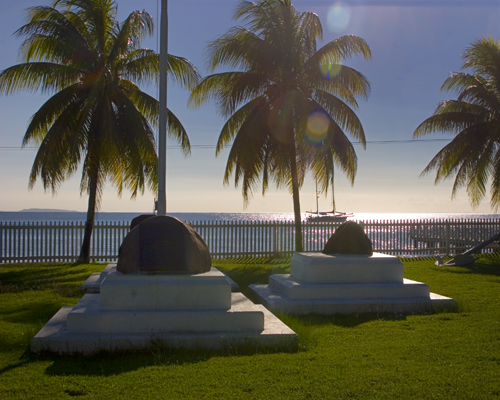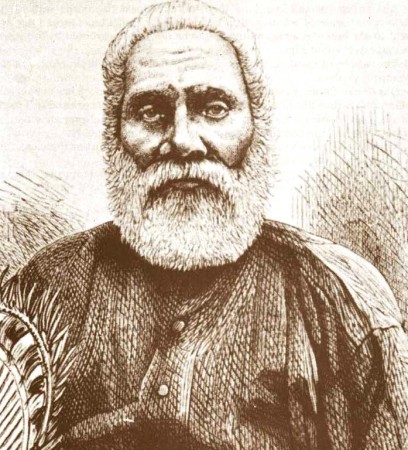
The Cession Monument where Fiji was given to England. See the sloop in the background? Photo by David Lansing.
Since there’s not much to do in Levuka, I spend a fair amount of time just walking about. This morning, after my usual stroll down Beach Street, I continued south of town past the wharf and tuna plant to the Cession Monument, where the Deed of Cession, making Fiji a British colony, was signed by Chief Cakobau in 1874. This wasn’t a pround moment in Fijian history.
Ratu (the name for chief in Fijian) Seru Epenisa Cakobau was born in 1815 and was known as one of the great Fijian warlords. Like his father before him (the name “Cakobau” means “destroyer of Bau”), the Ratu killed this chief and that chief until, around 1865, he had pretty much become the defacto King of Fiji. In 1871, he finally succeeded in creating a united Fijian kingdom and established Levuka as the capital.
But things quickly went south. The U.S. decided that since Ratu Cakobau was the king of Fiji, he was financially responsible for an arson attack against the home of the American consul, John Brown William, on the island of Nukulau and demanded $44,000 in compensation. And just where did the Americans think a Fijian Ratu was going to come up with $44,000 in the 1870s?
Of course, this was just a ruse and a way for the U.S. to assert more power in Fiji. Fearing an American invasion and annexation (just think—Fiji could have become the 50th state instead of Hawaii), Cakobau decided the best thing he could do was cede the islands to the United Kingdom. Which is how Fiji became a British colony for almost 100 years.
Three stones in a grassy little park near the water’s edge mark the signing ceremony that took place on October 10, 1874, as well as Fiji’s independence exactly 96 years later and the 1974 centennial celebration of the Deed of Cession.
You’ll notice in the photo of these stones that in the background is the British sloop I’ve talked about—the one Meli swears is haunted. Strangely enough, I’ve seen the boat anchored at a couple of different spots along the coast while I’ve been here. But I’ve still never seen anyone on board. And no one in town has any idea who actually owns the sloop. Perhaps it’s just another sad reminder of British colonialism on the islands. Like the stones in the park.
Time to move on…
-
Pingback from How Fiji became British | Island Tips on Friday, February 5, 2010 at 5:38 am
-
David writes: “Perhaps it’s just another sad reminder of British colonialism on the islands.”
Sad?? I assume that you might be American, David, and therefore given to contempt prior to investigation when it comes to this. If so, don’t fall for the myth of American exceptionalism. It’s a delusion that blinds too many and leads to a lot of distrortiopns of history.
The thing is, just on Fiji, Fijians were quite happy being a British colony (ask them!). There are worse things than getting an education system, railways, roads, nice public buildings and open and transparent rule of law – and the protection of the Royal Navy – and in truth, British colonialism was mostly a very different and far more benign kettle of fish to the brands of colonialism exercised by the other European powers (France, Spain, Holland, Portugal, Germany, even Belgium). Not always, of course, but mostly compared to then others, and everything needs to be seen in the context of the times. While they’d been beneficiaries of the trade, their democracy led the British to begin outlawing slavery in an act of parliament as far back as 1808. It was banned across the empire by the 1830s.
The Fijians have remained proud members of the British Commonwealth since full independence in the 1970s until their recent problems, and you’ll find pictures of the Queen in many Fijian homes. The only sadness for Fijians is that they are currently suspended from the Commonwealth because of the coup and the undemocratic military government that plans not to hold elections until 2014.
Don’t buy into the idea that American domination brought only democracy while the British brought exploitation. Both things apply to both countries. Both Hawaii and the Philippines were American colonies, and the Filipinos fought a bloody war around the turn of the 20th century in an unsuccessful attempt to free themselves from American military rule (I call it a colony because it was run entirely by a US military governor). The death toll from that conflict was in the region of 100,000 (not counting US losses).
On my travels around the Asia-Pacific region, I look at the former British colonies (all of whom are still happily linked to Britain) and see how well they are doing as flourishing democracies: Malaysia, Hong Kong and Singapore, for a start. No surprise that they have the highest standards of living in Asia. British democracy might be slightly different to the US brand, but it’s still open and transparent and centred, like that of the US, on rule of law.
The Philippines, however, has become corrupt. I had a Filipino historian express to me on my last visit there that, accepting the premise that colonisation was inevitable, it might have been better to have been colonised by Britain rather than Spain and the US, because the Spanish brought the autocratic, absolutist rule they were known for, and the Americans brought corruption.
He based his view – and they weren’t only his, he says – on the evidence of how well Malaysia, Singapore and HK had done compared to his country.
I think in the end, he thought Filipinos might have preferred the US to have excercised a more benign British style of colonialism and for a longer period, thus leaving more soundly grounded institutions and infrastructure. His view (given that the real reason the US was there was a strategic one): “When the Amercans realised it was cheaper just to run a navy base than a whole country, they decided to leave. That left us with little infrastructure, and we are still suffering from it today”. You certainly do notice the difference when you compare.
It’s also worth noting in any of these discussions that despite the myth of exceptionalism many Americans like to subscribe to, the US also owes its democracy to the British. The Bill of Rights is a classic example: Only the 9th amendment to the US constitution was not based on the laws of England that already existed in the 13 colonies prior to the revolution. Even the criminal law and the function of many other laws are still virtually identical in both form and function in both countries, and one important cornerstone, the writ of habas corpus, remains identical. These should be clues for the doubters.
Which is why, if you head on down to Australia, say, you are not going to find a nation that’s in any real way different to the US, even if it’s a smaller version, particulary now that its standard of living has outsripped that of the US overall.
It’s possibly an example of the US that might have been without a revolution and in truth, different roads led to the same place.
And when it comes to colonialism and the new imperialistic adventures (in this century, the previous one or then one before) of the English-speaking nations, the myth of exceptionailism is just that: a myth.
Nevertheless, you are right in one respect. Colonialism would have been a better thingt if it never existed at all.
-
There are a lot of things, however, that Fijians won’t tell the typical outsider as most foreigners would not comprehend certain things. As a Fijian, I grew up hearing things that the British did in Fiji that were deplorable such as outlawing the public use of the Fijian language and beating Fijian children in schools for speaking our mother tongue, killing members of tribes that never acknowledged British control of Fiji, making only ethnic Fijians carry passes with them so they could travel within cities as Fijians were outlawed from being in towns, needing licenses to perform certain cultural dances and performances, etc. Also, cession to Britain was also not something that was done willingly by Cakobau himself. I know members of the Cakobau family and I was told that Cakobau had muskets and bayonets put to his head and told that if he didn’t sign papers to allow Britain to take over Fiji, that many Fijian people would be killed without any hesitation.
The Brits also did something that was equally as despicable, which included the privatization of many Fijian lands before and after cession by illegal means such as kicking people off lands or entire islands and threatening them with death if they ever returned. About 10% of Fijian lands today are owned by non-Fijians because of this, including Wakaya Island and Maqo Island.
This is a Fijian perspective rarely heard and in this instance, I think certain things needed to be said. Thank you.
-
To set the record straight, the burning in Nukulau was done by an American caretaker who resided there. Typical of the prejudice whites they accused my Great Great Grand Father for the arson.
As a Fijian, I am proud for what Tui Viti (Cakobau) did in ceding Fiji to Great Britain. Can you imagine otherwise if the Americans had their way, we would be another Hawaii, a fijian foreign in his own land.As for you Justin, I am not sure where your information on the musket to the head came from. I assure you that your information is false. I am not sure where you plucked that from.
-
Overall, the countries that were once colonized by the British are much better off today, in comparison to the ones colonized by the US.
-
This is intresting stuff. Thank you for helping us write our presentation pon Chief Cakobau. We love you.
Meghan, Thomas, Joshua and Alice
-
Epenisa, part of what you say is partly true, and is also partly false. You are being a little prejudiced yourself, Tau. What Justin wrote of was a bit exaggerated, but such things did happen. I speak as a Fijian, and Ratu Cakobau was not just a saint; he also did things that brought Fiji downwards.
-
this help me find more info about were i come from
Comments are now closed.


11 comments